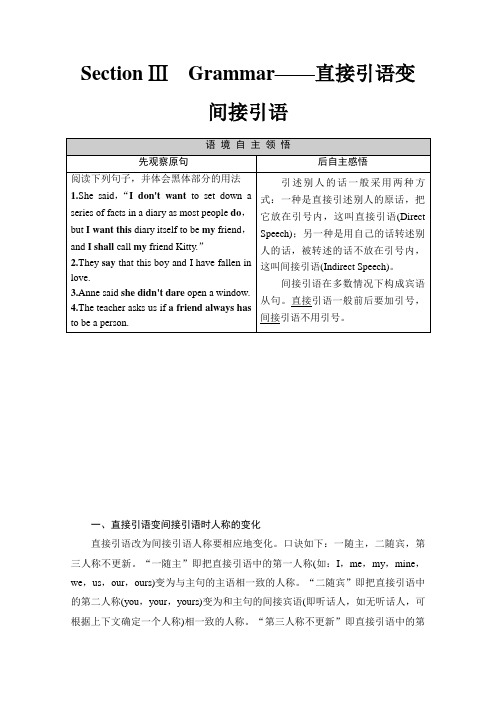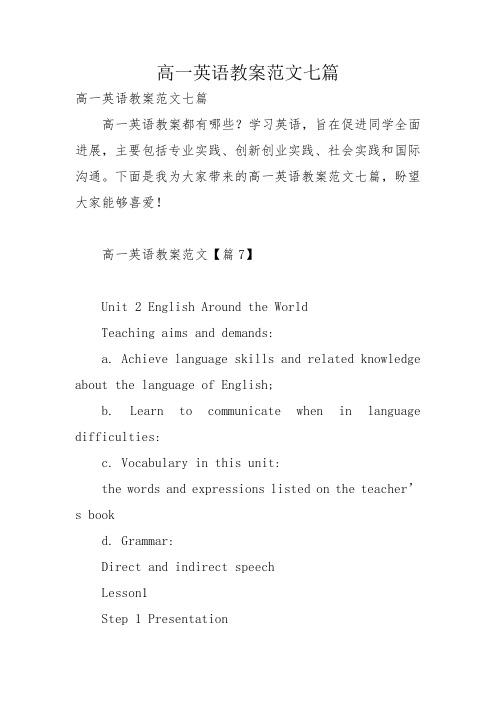Grammar-Direct and Indirect Speech (1)
英语基础知识点

英语基础知识点一、字母表 (Alphabet)英语字母表由26个字母组成,从A到Z。
每个字母都有大写和小写两种形式。
二、发音 (Pronunciation)英语的发音规则相对复杂,因为它包括元音和辅音的多种发音方式。
元音有五个:A, E, I, O, U,而辅音则包括其余的21个字母。
三、词汇 (Vocabulary)英语词汇量庞大,不断有新词加入。
基础词汇包括日常生活中常用的名词、动词、形容词、副词、介词、连词和感叹词。
四、语法 (Grammar)1. 句子结构 (Sentence Structure)- 主语 (Subject) + 谓语 (Predicate)- 简单句 (Simple Sentence)- 并列句 (Compound Sentence)- 复合句 (Complex Sentence)- 复合并列句 (Compound-Complex Sentence)2. 时态 (Tenses)- 一般现在时 (Simple Present)- 一般过去时 (Simple Past)- 一般将来时 (Simple Future)- 现在进行时 (Present Continuous)- 过去进行时 (Past Continuous)- 将来进行时 (Future Continuous)- 以及其他各种完美时态和完成时态。
3. 语态 (Voices)- 主动语态 (Active Voice)- 被动语态 (Passive Voice)4. 直接和间接语气 (Direct and Indirect Speech)- 陈述句 (Statement)- 疑问句 (Question)- 命令句 (Command)- 感叹句 (Exclamation)5. 冠词 (Articles)- 定冠词 (Definite Article): "the"- 不定冠词 (Indefinite Articles): "a", "an"6. 名词 (Nouns)- 单数和复数形式 (Singular and Plural Forms)- 名词的所有格 (Possessive Nouns)7. 代词 (Pronouns)- 人称代词 (Personal Pronouns)- 物主代词 (Possessive Pronouns)- 反身代词 (Reflexive Pronouns)- 指示代词 (Demonstrative Pronouns)- 疑问代词 (Interrogative Pronouns)- 不定代词 (Indefinite Pronouns)8. 形容词和副词 (Adjectives and Adverbs)- 形容词用于描述名词,副词用于描述动词、形容词或其他副词。
indirect1必修一Unit1语法

“I receive a 5-hour training every day.”
Phelps said he received a 5-hour training every day.
“I always desire to be the winner, to win gold medals and to break world records.” Phelps said he always desired to be the winner, to win gold medals and to break world records.
策划:《学生双语报》 9
Let’s observe
What should be changed? Tense 时态 Person人称 Time 时间 Place地点 Demonstrative pronoun 指示代词
When direct speech is about:
a) a truth 真理 b) a timetable 时间表 c) a saying/proverb/quotation 格言/引用语 d) An adverbial indicating the past 过去的时间状语
Phelps said he would always try his best to be Phelps No.1.
策划:《学生双语报》 7
2. We said to her, “They’re walking through the street now.” We told her that ___ through the street ___. A. we were walking…then B. you are walking…now C .they were walking…then D. they walking…now
directspeech&indirectspeech

said that she didn’t know the address of her new home. 2. Anne told her father that she had got tired of looking at nature through dirty curtains and dusty windows. 3. The girl said that she needed to pack up her things in the suitcase very quickly.
he said that he would be back. 变化:人称,时态,语序,指示代词,时间/地点状语等
陈 述 句
He said, ”I will be back.”
He said that he would be back.
一般疑问句 ask /wonder Whether/if 陈述句式 He asked me, ”Will you wait for me?” He asked me whether/if I would wait for him. 特殊疑问句 Ask/wonder wh- 陈述句式 He asked me, ”Why do you wait for me? ” He asked me why I waited for him. Exercise 2, P5
He said, ”I will be back!”
What did he say? He said that he would be back.
Grammar
Direct speech “照搬”,直接引语
“I‟ll be back!” he said.
P5
Indirect speech 转述,间接引语
英语专题-直接引语和间接引语

直接引语和间接引语(宾语从句)引述某人的话一般采用两种形式:一种是直接引语(Direct Speech),即原封不动地引用原话,把它放在引号内;另一种是间接引语(Indirect Speech),即用自己的话加以转述,被转述的内容不放在引号内。
A.陈述句的间接引语通常是say, tell等。
与此同时,间接引语中的人称、时态和其他方面也要相应有所变化。
The foreigner said to me, …I like Beijing very much.‟那老外告诉我:我很喜欢北京。
→The foreigner told me that he liked Beijing very much. 那老外告诉我说他(她)很喜欢北京。
She said, …We are very fond of sports.‟她说:我们都喜欢体育运动。
→She said that they were very fond of sports. 她说他(她)们都喜欢体运动。
…I'll go over the grammar lesson once again,‟ he said. 他说:我将把语法课再复习一遍。
→He said he would go over the grammar lesson once again. 他说他将要把语法课再复习一遍。
(that 可省略)B.疑问句的间接引语1.一般疑问句和反意疑问句一般疑问句改为间接引语时,要用陈述语序,并要加连词其主句动词常用ask, wonder, want to know, didn't know等。
句末不用问号。
My teacher asked me, …Do you like American country music?‟我老师问我:你喜欢美国乡村音乐吗?→My teacher asked me if/whether I liked American country music. 我老师问我是否喜欢美国乡村音乐。
高中英语:Unit 1 Section Ⅲ Grammar——直接引语变间接引语

Section ⅢGrammar——直接引语变间接引语一、直接引语变间接引语时人称的变化直接引语改为间接引语人称要相应地变化。
口诀如下:一随主,二随宾,第三人称不更新。
“一随主”即把直接引语中的第一人称(如:I,me,my,mine,we,us,our,ours)变为与主句的主语相一致的人称。
“二随宾”即把直接引语中的第二人称(you,your,yours)变为和主句的间接宾语(即听话人,如无听话人,可根据上下文确定一个人称)相一致的人称。
“第三人称不更新”即直接引语中的第三人称(he,him,his,she,hers,it,its,they,their,theirs,them)变为间接引语时,人称不变。
一随主:He said,“I like it very much.”→He said that he liked it very much.(I改为he,it不变)二随宾:He said,“You told me this story.”→He said that I had told him that story.(You改为I,me改为him,told改为had told)第三人称不更新:He said to me,“She's left her book in your room.”→He told me that she had left her book in my room.(She's改为she had,her不变,your改为my)[即时演练1]句型转换①The workers said,“The leaders often make the workers work extra hours.”→The workers said that the leaders often made the workers work extra hours.②Mary said,“I want to have a computer of my own.”→Mary said that she wanted to have a computer of her own.③Her colleague said to her,“Who did you ask for a leave?”→Her colleague asked her who she had asked for a leave.二、直接引语变间接引语时时态的变化1.主句的谓语动词是一般过去时。
人教新课标高一英语必修1第二单元(Book 1) Unit 2 English around the world学案含答案

Unit2 English around the world(Module 1)Period 1 Reading: The Road to Modern English班级__________ 姓名____________ 学号_____________ Learning Objectives:1.Learn the useful new words and expressions.2.Read the passage and learn about the development of English.3.Learn the reading sub-skills-- scanning and skimmingLearning Key Points:Learn reading skills: scanning and skimmingLearning Difficult Points:Improve the reading ability.Learning Procedures:I.【Pre-class homework】自主探究A:Tell the sentences True or False1.English had the most speakers in the 17th century.2.English developed when new settlers and rulers came to Britain.nguages frequently change.4. The language of the government is always the language of the country.5. English is one of the official languages used in India.6. This reading describes the development of the English language.B:fill in the form according to text.AD450--1150 English was based on ____1_______At the end of the 16th century How many people speak English?_______2___Shakespeare made use of a wider vocabulary.______3____Some British settlers moved to America._______4____English began to be spoken in _______5___ Later in the 18th centuryThe language was settled._____________6___II.【While-class】Step 1 Lead-inStep 2 Group discussion 合作讨论展示点评Ss discuss their pre-class homework in group.Step 3 Practice:练习拓展A:Choose the correct answer1.English has/had the most speakers___.A.NowB. when the British ruled many parts of the worldC. in the time of ShakespeareD. in the 12th century2.Which of the following statement is true?A. Languages always stay the sameB. Languages change only after warsC. Languages no longer changeD. Languages change when cultures change3. Why was Shakespeare able to make use of a wider vocabulary by the 1600s?A. Because new settlers enriched English and especially its vocabulary.B.Because Shakespeare made up many new words.C. British settlers moved to different countries.D.A new dictionary was written.4.What happened to American English in the 19th century?A.It became more like British EnglishB. It became more like German.C.It had its own dictionary.D.Its spelling was given a separate identity.5.Which of the following is NOT true?A.English is one of the official language in India.B.English developed when new settlers and rulers came to Britain.C.China has the largest number of English speakers.D.Now more people speak English as their first , second or a foreign language.B. Fill in the blank with proper wordsEnglish has changed and developed 1.________cultures meet and communicate with each other.2.________AD 450 to 1150 , new settlers to English 3._______(rich) the English language and enlarged its vocabulary. In 1620, British people began to move to other countries, and 4.______________ (gradual ), English was spoken in many other countries. By the 19th century American English spelling got a separate 5._______________when Noah Webster wrote his dictionary. At 6___________, more people speak English as their first , 7_________ or a foreign language than ever before. People in South Asia 8__________ as India, Singapore speak 9______________ English.China may have the 10________________ number of English learners.Step4 PresentationStep5 SummaryIII.【Post-class】巩固提升Ⅳ.总结提升Self- reflectionI enjoyed learning about:I found these words useful:I found these expressions useful:I have learned about:Some examples:Suggested answers:Ⅰ.课前预习A: FTFFTTB: 1.German 2. 5-7million 3.By the 1600’s 4. In 16205. Australia6. By the 19th centuryII.课堂检测:A:1. A 2. D 3. A 4. D 5. CB:1.when 2. From 3. enriched 4. gradually 5. identity6. present7. second8. such9. fluent 10. largestPeriod 2 Language focus in Reading班级__________ 姓名____________ 学号_____________Learning Objectives:1. Learn and grasp the important useful new words and expressions.2. Learn the important useful sentences and patterns.3. Make sentences after the useful expressions.Learning Key points:Enable Ss to grasp the usages of such important new words and expressions.Learning Difficult Points:Get Ss to understand some difficult and long sentences.Learning Procedures:I.【Pre-class homework】(自主探究) :Make sentences using the following wordsand phrases:1.actually2.base3. because of4. come up5. at present6. make use of7.such asII.【While-class】Step 1 Lead-inStep 2 Group discussion 合作讨论展示点评Ss discuss their pre-class homework in group.Step 3练习拓展1.Today, more people speak English as their first, second or a foreign languagethan ever before.汉译英:________________________________________________________仿写:中国比以往任何时候都更加富有强大。
高一英语教案范文七篇

高一英语教案范文七篇高一英语教案范文七篇高一英语教案都有哪些?学习英语,旨在促进同学全面进展,主要包括专业实践、创新创业实践、社会实践和国际沟通。
下面是我为大家带来的高一英语教案范文七篇,盼望大家能够喜爱!高一英语教案范文【篇7】Unit 2 English Around the WorldTeaching aims and demands:a. Achieve language skills and related knowledge about the language of English;b. Learn to communicate when in language difficulties:c. Vocabulary in this unit:the words and expressions listed on the teacher’s bookd. Grammar:Direct and indirect speechLesson1Step 1 PresentationGet the students have an general idea about the differences between American and British English by playing a tape of various people’s talking. Ask them what countries they think these people come from. Step 2 Warming UpGet the students to look at the picture and ask the questions: What do you think Joe is looking for in the bathroom? Why can’t he find it?Step 3 ReadingAsk the students to read the dialogue carefully in part 1. Then get the students to think: What is it that causes the misunderstanding between Joe and the landlady, Nancy? If necessary, explain some language points.Step 4 SpeakingAsk the students to read the dialogue in the part SPEAKING to learn more differences between the British and American English. Then complete the following sentences as well.Step 5 PracticeAsk the students to make a similar dialogue.Step 6 ListeningListen to the tape and fill the blanks in the part LISTENING.Step 7 HomeworkFinish exercise1 on page 91 in the TALKING part. Lesson2Step 1 RevisionCheck the homework.Step 2 PresentationShow the students some pictures in different situations in order to get them know everywhere English is needed.Step 3 ReadingAsk the students to read the text. And find the topic sentence in each paragraph.Step 4 Post-ReadingAsk the students to answer the questions in the part POST-READING. If necessary, explain some language points. Then according to what they have read, get them to fill in the blanks in the following exerecise2. Step 5 HomeworkFinish exercise in the part PRACTISING in their workbooks..Lesson 3Step 1.RevisionCheck the home work.Step 2 Word StudyAsk the students to match the words on the left with their meaning on the right.Step 3 GrammarAsk the students to say something about the differences between a command and a request. Then tell which is a command and which is a request.Step 4 PracticeLet the students to change the sentences into Direct Speech. And then finish exercise 3 in the same part.Step 5 WorkbookIf times permits, ask the students to finish the exercise2 in their workbooks in part Grammar.Step 6 HomeworkReview the last part what is Direct Speech and what is Indirect Speech.Lesson 4Step 1 RevisionCheck the homework. by doing exercise 1 in part Grammar in the workbook..Step 2 PresentationPlay a tape of various people’s talking. Ask which is from England and which from America. How do they tell? In this way draw the students’attention to the difference on the pronunciation.Step 3 ReadingAsk the students to read the text and be prepared for one question how come the difference between the American English and the British English. Explain some language points if necessary.。
人教版高中英语必修一B1U1

yourself.“
- Lysha
"The better part of one's life consists of his friendships." - Abraham Lincoln
Friendship Quotes: "Friendship is the golden ribbon
that ties the world together." Kristina Kentigian
Word study
share
use equally
We haven’t enough books for everyone,some of you will have to share.
I have to share the bathroom with the rest of the family.
Word study
get along with
How’s your son getting along with his school work? How are you getting along? I’m getting along very well with my new work. He couldn’t get along with anybody? I’ll get along with a bicycle until we can afford a car.
a friend should:
tell me the truth(be honest) be good (friendly) to me be willing to consider or accept others’ ideas
